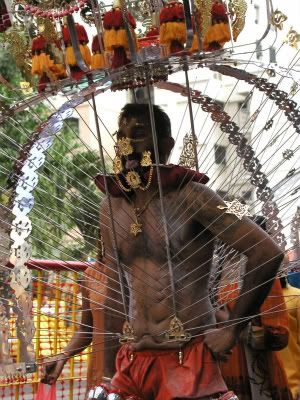Huang Z’ming

A Thaipusam procession participant
As a religious spectacle, the Thaipusam procession in Singapore is said to easily surpass its equivalent in India – no mean feat, considering that the Hindus are but a 5 per cent minority here. Once a year, tens of thousands of devotees would be seen carrying kavadis or milk pots for a few kilometres, on a day that is not even a public holiday (there is one single holiday for the Hindu population in Singapore, and that is the Deepavali). But even greater in number than them are the spectators among the crowd, making the event a major tourist attraction that happens to be authentic and nothing that the Singapore Tourism Board could ever have dreamt up.
Rather amazing, as we are speaking essentially of a population with a mother tongue no other Singaporeans would ever bother to learn (unless of course, one sells gold jewelery in Little India). But most astounding and very puzzling, is how the procession suddenly seems headed for a crisis this year, as the authorities announce newly compiled guidelines to say enough is enough, things must be toned down – and then just as inexplicably, the authorities decide to bite their tongues. What’s going on?
The Hindu Endowments Board guidelines – which say no singing, no beating of drums or gongs and no playing of recorded music shall be allowed – caused an immediate uproar that was palpable in the internet, on Facebook, and on TOC (The Online Citizen, the website for Singaporeans to share opinions on current affairs, which the Prime Minister personally demanded to be gazetted as a political association just this month). M. Ravi, a human rights lawyer (a rare breed in Singapore, it always seems to be him, no?), even filed summons against the Attorney General’s Chambers and Hindu Endowments Board (HEB), claiming the guidelines are in breach of minority rights and violate the fundamental rights to freedom of speech, assembly and expression of Hindu devotees.
Remarkably, even netizens of other faiths and ethnic origins have expressed dissent against the guidelines. Perhaps many Singaporeans have come to recognise the various festivities of different ethnic groups as part of their common heritage. Or perhaps one realises that with Singapore’s brand of multi-racial policy, similar draconic rules may soon be applied to other religious groups. Or people have simply been living much too long in a society where one is told to shut up and keep quiet, and this just can’t go on forever. In December, for instance, the police rejected applications by two civil society groups, Home and TWC2, to hold activities commemorating International Migrants Day. To the organisers, it was incomprehensible how a vehicle procession to raise awareness on the dangers of workers transported on the back of lorries, or the distributing of flyers on an UN convention for the protection of migrant workers, could cause problem with law and order.
I have to say here first that I think many of the non-Hindus who have reacted strongly on this Thaipusam issue may just be missing on some social and cultural background behind the guidelines. It has emerged, for instance, with regards to the loud music, face-painting and shouting, that there is concern of gangsterism mixed up in this religious festival. One item among the guidelines is also to disallow consumption of alcoholic beverages. There are in fact those within the Hindu community who think some participants are simply deviating from the true religious spirit and not keeping to the decorum. Such debates are not unique to Singapore, in fact at Batu Caves in Malaysia, there are debates not only as to whether bongo drums would be deemed appropriate as accompaniment for Kavadi according to the scriptures, but also whether innovative expressions like breakdancing should be allowed as part of the event.
Now all such discussion is well and good. Let the community discuss. But my question is: which part of this is the concern of HEB and which part is the concern of the police, and why not explain all the rationale in the first place? Don’t get me wrong, I can even accept that these guidelines have largely or basically or roughly been around all of these years, nothing has really changed. I can also have full faith in the temple officials and the police working together to maintain some order, that they are not there to make things difficult for devotees, they will exercise discretion and just pick out the troublemakers.
The newly compiled guildelines announced in the newspapers are simply, shall we say, a gentle reminder that is being conveyed in a harsh way? It is just to scare people a little, maybe? But suddenly, as the Law Minister comes out to ‘clear the air’, we are not sure who is becoming scared after all this, is the HEB scared to take the blame of controlling the festival and is saying everything just reflects conditions of police permit, or is the police hiding behind HEB? (After reading the newspaper articles, some readers naturally imagine it’s all because some rich resident who has moved into a new condo calling 999 to complain on the noise.) It even seems as if the authorities are hiding behind the news media, saying they have given the wrong information. Not surprisingly, some netizens will now say all this farce is because they are worried about election.
It is indeed impressively dramatic how the Law Minister Shanmugam has managed to enlighten us and turn our understanding of the situation around. Suddenly we are told the guidelines are not becoming harsher this year, but on the contrary, they are being eased! For the first time, they will allow the singing of hymns! It feels as though we ignorant folks are dealing with a deity with a few different faces, one minute it seems like Kali Yuga has dawned upon us and we will all be punished, another minute we are greeted with a smiling face and the true story with its moral is finally revealed to us, all in good time only. We poor lowly souls that would never learn otherwise; we are apparently not fit to interpret the laws ourselves anyway, and don’t need understand when it will be enforced, just leave it to the powers that be.
But perhaps it would have made things simpler by leaving discussion of religious issues out of it first, after all HEB is just a statutory board, it is made up of administrators, not gurus or sanyasis. (Incidentally, its predecessor was the Mohammedan and Hindu Endowments Board formed in 1907, in other words a set-up inherited from colonial times.) When members under a government ministry appear to be deciding on religious matters for the community, it can get complicated, for who should have authority on such issues? (I’m only glad we are not like China which appoints its own Catholic bishop, not recognised by the Pope in Vatican.) But somebody who carries kavadi may well wonder whose idea it is to recommend singing of hymns such as ‘kavadi chindu’ in the guidelines. For those in the know, these are songs of very moderate speeds, and mostly in just one raga. One won’t fall into a trance easily with songs like this, I guess. One crucial point in M. Ravi’s appeal which has been thrown out two days before the procession, is that disallowing music and dance would ‘endanger the safety and personal liberty of devotees’, especially whilst in trance.
Well I am merely expressing my personal views here since I am anything but an authority on Thaipusam myself. I’m not even sure if I would be right if I say that Thaipusam in India is a much tamer affair. Some people say that the kind of piercing we see here is banned in India because it is deemed primitive. But then again you can’t trust everything people say. There are people will tell you the caste system is banned in India too. (So where does all that forward caste and backward class come from? They probably mean discrimination is outlawed, but there is affirmative action.) And as for the subtler meanings of the piercing, well, it is just not something that can be discussed here, Hindu practices are much too complicated to be agreed upon. Most of us felt thrown off immediately like the earth was shaking when we heard there is a 13th horoscope, Ophiuchus; well Indian astrology has always been doubly complicated, so let’s not start.
All I believe is that our Thaipusam as celebrated uniquely or not in Singapore is part of our culture to be preserved by the will of the community itself. Frankly, my first suspicion when I heard the news was: What? You mean the STB is advising that the procession should be kept more ‘traditional’? Who knows, there are seriously all kinds of possibilities that might have been on the minds of the decision-makers while they were discussing all kinds of concerns in a stressful afternoon of tea and vadai. Personally, I can’t say I understand the mentality if people are re-inventing kavadi here just to compete against one another. But cultures do evolve, and what we like to deem as the peripheral today may soon prove to worth more recognition. We are a country known for inflicting pain through caning; do we also have to control how people inflict pain on themselves?


I searched Google for draconic and I found your blog I like your blog, well done!
I like your blog, well done!